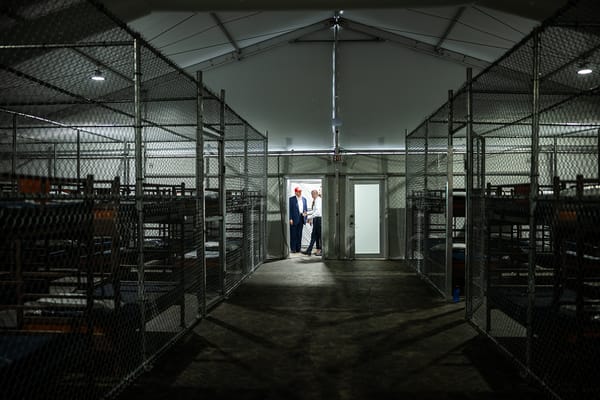Indignity Vol. 2, No. 52: Special pleading.
FINAL JUDGMENT DEP'T.

The Supreme Court Overturns Itself
GUILT AND SHAMELESSNESS are a grim combination. The Supreme Court majority saved its rulings in New York State Rifle and Pistol Association v. Bruen and in Dobbs v. Jackson Women's Health Organization for the final days of its term, putting them out after nearly every other case had been decided. The right-wing justices knew the public would be shocked and outraged by their striking down gun restrictions, after a particularly horrifying series of shooting massacres, and by their throwing out the whole structure of abortion rights that had been in place for generations. But they also knew that the public couldn't stop them.
The original draft of the Dobbs ruling was leaked nearly two months ago, while in the Bruen case the justices had merely made it clear in oral arguments what they would do. In both cases they were overturning laws or precedents that had been in place longer than most Americans have been alive, and they were simply doing it on the basis that the right had seized enough court seats to make it possible.
"The majority has overruled Roe and Casey for one and only one reason: because it has always despised them, and now it has the votes to discard them," the three dissenting justices in Dobbs wrote. "The majority thereby substitutes a rule by judges for the rule of law."
Read back to back, the rulings conveyed nothing but contempt. "The Constitution makes no reference to abortion, and no such right is implicitly protected by any constitutional provision," Samuel Alito wrote for the majority in Dobbs. In Bruen, meanwhile, Clarence Thomas wrote passionately and at length about a constitutional right to "individual self-defense," which he described—quoting the court's earlier decision against Washington, D.C.'s handgun ban in District of Columbia v. Heller—as "'the central component' of the Second Amendment right.” The Constitution, of course, makes no reference to individual self-defense, and those words certainly do not appear in the amendment where Thomas described them as being the central component.
Likewise the majority in Dobbs spent pages on pages deriding the trimester-based limits put forth in Roe v. Wade, and the "undue burden" standard set by its successor, Planned Parenthood v. Casey, as arbitrary inventions put forth by the court. Throughout the Bruen decision, when Thomas wrote about the substance of the Second Amendment, the text he quoted was almost invariably not from the 27 words of the amendment—13 of which declare that the amendment's purpose is to set the terms for government regulation of militias—but from Antonin Scalia's decision in Heller. A prior court's extensions of the Constitution are valid if the current majority finds them useful, and invalid if those justices find them inconvenient.
One could go back and forth between the texts endlessly. On Thursday, Thomas wrote that "the bare existence of" 19th century bans on carrying weapons in the Western Territories "cannot overcome the overwhelming evidence of an otherwise enduring American tradition permitting public carry." On Friday, Alito wrote that the absence of laws against early-term abortion in some states "does not mean that anyone thought the States lacked the authorty" to pass such laws. Where laws did exist, they weren't real; where laws didn't exist, they could have been real.
The dissent in Dobbs directly pointed out that the two majority decisions contradicted each other on principle. In Bruen, the right-wing justices rejected arguments invoking pre-colonial English laws about bearing arms; in Dobbs, the majority's citation of legal arguments against abortion, "goes back as far as the 13th (the 13th!) century," the dissenters wrote. "Historical evidence that long predates [ratification] may not illuminate the scope of the right," they added, citing and quoting the day-old Dobbs ruling verbatim.
The Dobbs dissent also noted that the majority had cited, as evidence of historic limits to abortion, the fact that laws restricting abortion had been passed after the ratification of the Fourteenth Amendment: "As the same majority (plus one) just informed us, 'post-ratification adoption or acceptance of laws that are inconsistent with the original meaning of the constitutional text obviously cannot overcome or alter that text.'"
Even within the Dobbs decision, the majority couldn't keep its story straight. "[O]ur decision is not based on any view about when a State should regard pre-natal life as having rights or legally cognizable interests," Alito wrote. Three pages later, he wrote that the difference between Roe and Casey and cases upholding the right to use contraception or to marry across racial lines was that the abortion cases involved a "critical moral question": "Abortion destroys what those decisions call 'potential life' and what the law at issue in this case regards as the life of an 'unborn human being.’"
Again and again, the anti-abortion justices tried to have it both ways, to deny what they were doing even as they did it. "The most striking feature of the dissent is the absence of any serious discussion of the legitimacy of the States' interest in protecting fetal life," Alito wrote. On the very next page, he wrote, "Our opinion is not based on any view about if and when prenatal life is entitled to any of the rights enjoyed after birth."
There was no need to present a coherent argument, or even a united front. In Dobbs, Brett Kavanaugh filed a concurrence emphasizing that the court had overturned Roe in a spirit of scrupulous neutrality on the question of abortion, and that the right to contraception in Griswold v. Connecticut or the right to same-sex marriage in Obergefell v. Hodges were not at all implicated in the decision. "Overruling Roe does not mean the overruling of those precedents, and does not threaten or cast doubt on those precedents," Kavanaugh wrote.
Below him, in a competing concurrence, Clarence Thomas wrote, "in future cases, we should reconsider all of this Court's substantive due process precedents"—including, he wrote, Griswold and Obergefell. The precedent had been set; there are no more precedents.






